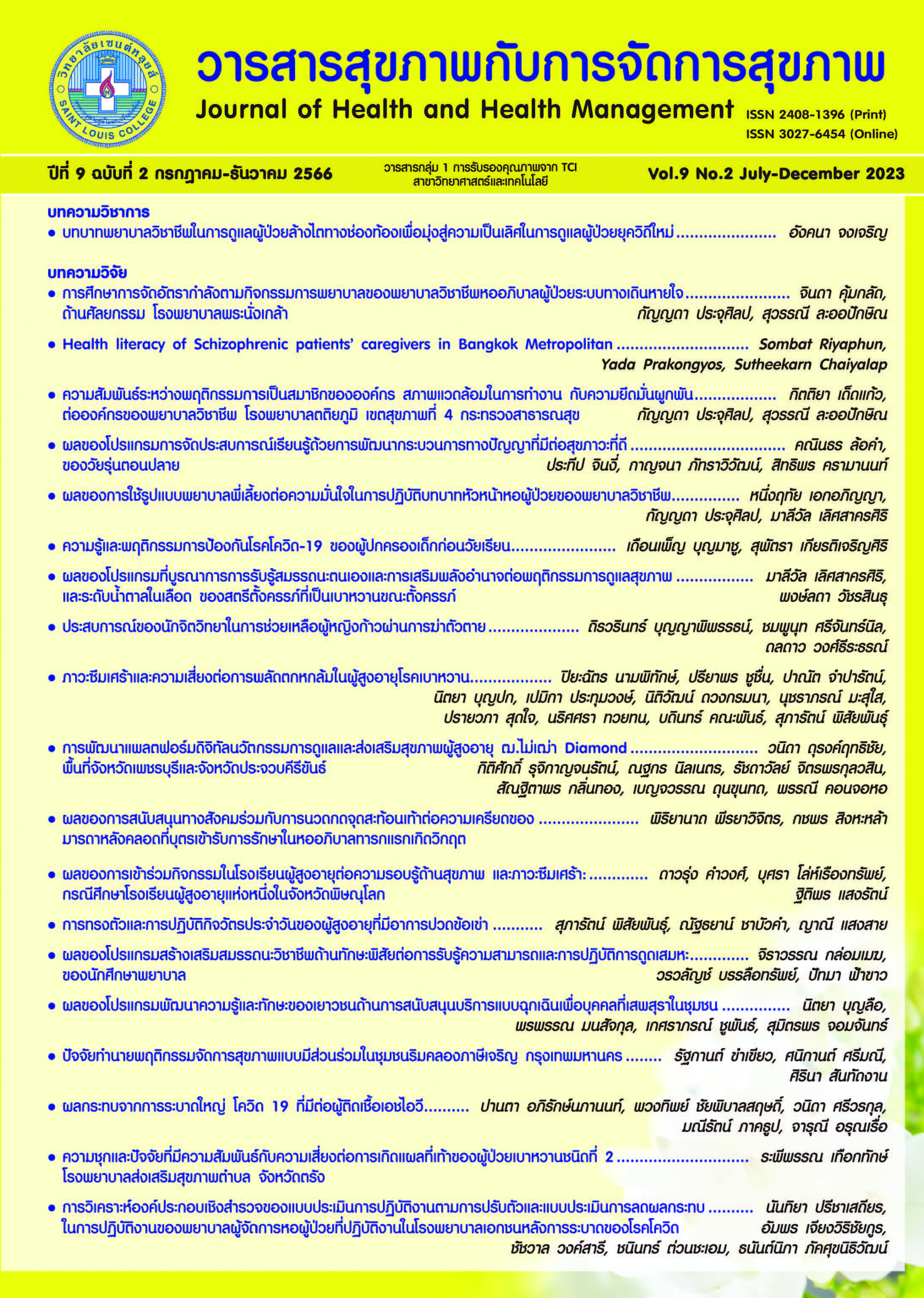The Effect of Program Integrated with Self-efficacy and Empowerment on Self health Care Behaviors and Blood Sugar Level in Pregnant Women with Gestational Diabetes Mellitus
Keywords:
Program integrated with self-efficacy and empowerment, self health care behaviors, blood sugar level, pregnant women with gestational Diabetes MellitusAbstract
This research was a quasi-experiment with pretest-posttest two groups design. The purpose of this research was to study the effect of program integrated with self-efficacy and empowerment on self health care behaviors and blood sugar level in pregnant women with gestational diabetes mellitus. The samples were selected by purposive sampling composed of the 60 pregnant women with gestational diabetes mellitus at antenatal clinic in the Rajvithi Hospital, that separated into two groups (experimental group and control group). The research tool was a test of knowledge in gestational diabetes mellitus, and questionnaire including personal data, self-efficacy, and self health care behaviors. The research tool was validated by 3 experts. The content validity index (CVI) was .80, the reliability were .79, .78, and .89, respectively. The data were analyzed by frequency, percentage, mean, standard deviation, and t-test. The results indicated that after experiment the pregnant women with gestational diabetes mellitus type A1 who used the program integrated with self-efficacy and empowerment have knowledge, self- efficacy, self-esteem, and self health care behaviors which were statistically higher than the control group at p<.05, .001. For the third time of the experiment group, both the FBS and 1 hour post-meal blood glucose levels were lower than the control group with statistical significance at the .05 level. This program can help pregnant women with gestational diabetes mellitus type A1 have knowledge, understanding, and confidence in their ability to act while having diabetes have good health care behaviors. It can control blood sugar effectively.
References
กฤษณี สุวรรณรัตน์, ตติรัตน์ เตชะศักดิ์ศรี, และสุพิศ ศิริอรุณรัตน์. (2562). ผลของโปรแกรมสนับสนุนการจัดการตนเองต่อพฤติกรรมการจัดการภาวะเบาหวานด้วยตนเอง และระดับน้ำตาลในเลือดของหญิงที่มีภาวะเบาหวานขณะตั้งครรภ์.วารสารวิทยาลัยพยาบาลพระปกเกล้า จันทบุรี, 30(2), 1-13.
เกษร แก้วผุดผ่อง. (2561). ผลการใช้โปรแกรมส่งเสริมการดูแลสุขภาพตนเองต่อพฤติกรรมการดูแลตนเองของสตรีที่เป็นเบาหวานขณะตั้งครรภ์. วารสารวิชาการแพทย์เขต 11, 32(1), 907-917.
ข้อมูลสถิติคลินิกฝากครรภ์และห้องคลอด ปีพ.ศ. 2563-2565. (2565). ข้อมูลสตรีตั้งครรภ์ที่เป็นเบาหวาน. กรุงเทพฯ: โรงพยาบาลราชวิถี.
นวลพรรณ เอี่ยมตระกูล. (2556). ผลของโปรแกรมการปรับเปลี่ยนพฤติกรรมสุขภาพ 3 Self ที่มีต่อความรู้ การรับรู้ความสามารถ การกำกับพฤติกรรม การดูแลสุขภาพตนเอง และระดับน้ำตาลในเลือดของหญิงตั้งครรภ์ที่เสี่ยงต่อโรคเบาหวาน โรงพยาบาลเลิดสิน. วารสารพฤติกรรมศาสตร์เพื่อการพัฒนา, 5(1), 129-138.
บุญใจ ศรีสถิตย์นรากูร. (2553). ระเบียบวิธีการวิจัยทางพยาบาลศาสตร์ (พิมพ์ครั้งที่ 5). กรุงเทพฯ: ยูแอนด์ไอ อินเตอร์มีเดีย.
ประภัทร วานิชพงษ์พันธุ์. (2560). ตำราสูติศาสตร์. กรุงเทพฯ: ภาควิชาสูติศาสตร์-นรีเวชวิทยา คณะแพทยศาสตร์ศิริราชพยาบาล มหาวิทยาลัยมหิดล.
มาลีวัล เลิศสาครศิริ. (2565). แนวคิดและการพยาบาลสตรีตั้งครรภ์ที่มีภาวะแทรกซ้อน ปรับปรุงใหม่. (พิมพ์ครั้งที่ 3). กรุงเทพฯ: บริษัท จามจุรีโปรดักส์ จำกัด.
วลัยลักษณ์ สุวรรณภักดี. (2561). ผลของโปรแกรมส่งเสริมสมรรถนะแห่งตนต่อพฤติกรรมการรับประทานอาหารและการออกกำลังกายของหญิงตั้งครรภ์ที่เป็นเบาหวาน (วิทยานิพนธ์ปริญญาพยาบาลศาสตรมหาบัณฑิต (การผดุงครรภ์)). มหาวิทยาลัยสงขลานครินทร์, สงขลา.
อัญชลี จิตราภิรมย์, และจันทรรัตน์ เจริญสันติ. (2558). ประสิทธิผลของโปรแกรมการให้ความรู้และการฝึกผ่อนคลายต่อพฤติกรรมการดูเเลตนเอง ระดับน้ำตาลในเลือด เเละความเครียดของสตรีที่เป็นเบาหวานขณะตั้งครรภ์. พยาบาลสาร, 42 (4), 133-145.
อดิณา ศรีสมบูรณ์, สุเพียร โภคทิพย์, และจรูญศรี มีหนองหว้า. (2564). ผลของโปรแกรมการดูแลตนเองต่อพฤติกรรมการควบคุมอาหาร และระดับน้ำตาลในเลือดของหญิงที่มีภาวะเบาหวานขณะตั้งครรภ์ในโรงพยาบาลสรรพสิทธิประสงค์. วารสารวิทยาศาสตร์สุขภาพวิทยาลัยพยาบาลสรรพสิทธิประสงค์, 5(1), 34-43.
American College of Obstetricians and Gynecologists. (2013). Committee on practice bulletin no. 137: Gestational diabetes mellitus. Obstetrics and Gynecology, 122(1), 406-416.
American Diabetes Association. (2014). Standards of medical care in diabetes—2014. Diabetes care, 37(1), S14-S80.
Bandura, A. (1997). Self-efficacy: The exercise of control. New York: Freeman.
Faul, F., Erdfelder, E., Lang, A. G., & Buchner, A. (2007). G* Power 3: A flexible statistical power analysis program for the social, behavioral, and biomedical sciences. Behavior research methods, 39(2), 175-191.
Gibson, C. H. (1991). A concept analysis of empowerment. Journal of advanced nursing, 16(3), 354-361.
Pender, N. J. (2011). Health promotion in nursing practice. (6th ed). New Jersey: Pearson.
Qadir, S. Y., Yasmin, T., & Fatima, I. (2012). Maternal and foetal outcome in gestational diabetes. Journal of Ayub Medical College Abbottabad, 24(3), 17-20.
Sherer, M., Maddux, J. E., Mercandante, B., Prentice-Dunn, S., Jacobs, B., & Rogers, R. W. (1982). The self-efficacy scale: Construction and validation. Psychological reports, 51(2), 663-671.
Downloads
Published
How to Cite
Issue
Section
License
Copyright (c) 2023 Journal of health and health management

This work is licensed under a Creative Commons Attribution-NonCommercial-NoDerivatives 4.0 International License.




